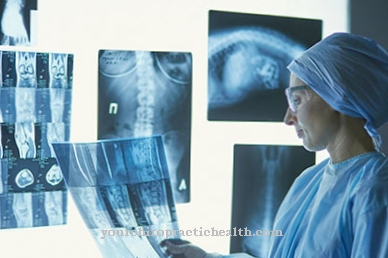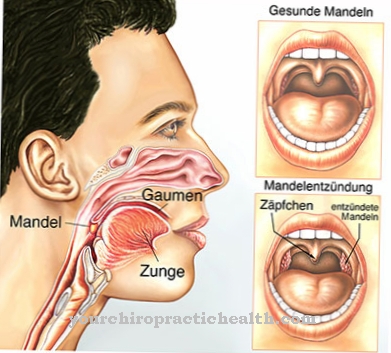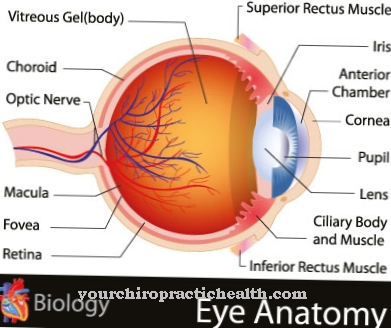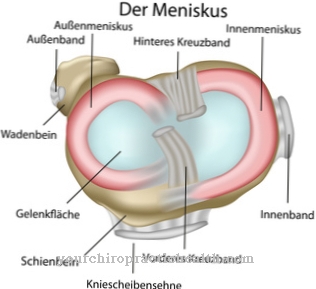In connection with a severe and sometimes life-threatening infection of the same name in the stomach and intestinal tract, the Noroviruses or the resulting Norovirus infection got into conversation.
What is norovirus infection?
.jpg)
© teguhjatipras - stock.adobe.com
The Noroviruses are the focus of the so-called norovirus gastroenteritis with regard to stubborn diarrhea. Due to this fact, the norovirus can lead to serious complications in the elderly and children.
The noroviruses are considered to be very infectious, which means that the norovirus infection is one of the communicable and contagious diseases. The Novovirus is an extremely vigorous virus that consists of three types. Within these individual types there are around 20 subspecies of the norovirus.
The norovirus infection can spread so extremely quickly because the human immune system cannot build up a natural defense. Norovieren are considered to be extremely resistant. The prerequisite for this is their amazing and almost frightening versatility.
causes
The Norivores, as the cause of the Norovirus infection, survive by the route of transmission known as the fecal-oral route. This means that a person who already carries the norovirus in himself releases the vectors in his feces.
Oral contact takes place through the ingestion of noroviruses through the mouth. This transmission route of the noroviruses for the norovirus infection is based on direct contact between the infected and the healthy. In addition, people can become infected through various foods that contain the noroviruses that are ingested through the mouth while eating.
How dangerous the noroviruses are is shown by the fact that a quantity of 10 noroviruses is sufficient to get sick with a norovirus infection.
Symptoms, ailments & signs
The first signs of norovirus infection are sudden abdominal pain and nausea, followed by gushing vomiting and diarrhea. All the typical symptoms of gastrointestinal flu appear. The patient feels extremely ill, is tired and weak, and is barely able to get out of bed or stand up straight. In addition, there are headaches and body aches and every movement hurts.
The body temperature can be slightly increased, real fever rarely occurs. Depending on the general state of health of the body, the symptoms can be stronger or weaker. In babies, children and older adults, whose organism is more vulnerable, the acute phase of the disease can be very severe and possibly even life-threatening.
The severe loss of fluid caused by diarrhea and vomiting can show signs of dehydration, such as dry skin and mucous membranes, rapid heartbeat or decreased urine output. Seizures, circulatory problems, or kidney failure can also occur as a result of dehydration.
In severe cases, the extremely strong bowel movements can even lead to an invagination of the bowel, which causes colicky abdominal pain and requires medical supervision. With a normal course, the symptoms subside after about 12 to 48 hours. In some people, the norovirus infection runs completely with no or only very mild symptoms.
Course of disease
After the penetration of the Noroviruses The incubation phase occurs first in the organism, in which the noroviruses multiply. After this incubation period, which usually does not last longer than 2 days, the first symptoms of a norovirus infection appear.
In addition to acute, violent diarrhea and vomiting without previous impairment of well-being, the norovirus infection is characterized by an extreme loss of body fluid. This goes hand in hand with a shift in the electrolyte balance, which causes circulatory failure and a partial or complete loss of function of various organs due to the noroviruses.
A classic sign that remains with the norovirus infection throughout the course of the disease is persistent vomiting diarrhea. Norovirus infection can quickly lead to death, especially in infants, children and people weakened by age or illness.
Complications
Infection with noroviruses rarely leads to complications. If they do occur, it is mainly small children and the elderly who are affected, who then need appropriate medical care. Noroviruses drain the body very strongly due to their peculiarity of causing diarrhea and vomiting.
Accordingly, attention must be paid to an increased supply of fluids and nutrients. If this is not done, the body can be severely weakened by the loss of water and electrolytes. This can lead to seizures, thrombosis and shock.
The dehydration can lead to cardiovascular failure, which can be fatal under certain circumstances. Damage to the internal organs is also possible through dehydration and a metabolic imbalance in the cells. Organs that participate in metabolic cycles are particularly affected here. This includes the kidneys and liver, for example.
If the body is no longer able to withstand the brief but severe symptoms of illness, death threatens. However, this is the case in less than 0.1 percent of diseases and can be prevented by giving enough water and food. Most people who ultimately die from complications from norovirus are over 80 years old.
When should you go to the doctor?
Even if the infection with noroviruses results in severe watery diarrhea and vomiting, in principle it heals without any complications even without a doctor's visit after a few days. However, there are cases when going to the doctor is advisable. This is the case on the one hand with severe symptoms and on the other hand when the patient belongs to certain risk groups.
Anyone who is infected with noroviruses often loses a lot of fluid through diarrhea and vomiting, and thus also electrolytes, which can lead to cramps and poor circulation. If the lack of fluids or electrolytes cannot be compensated for by drinking enough fluids, a visit to the doctor is advisable: you can compensate for both with a sufficient amount of infusion. The symptoms then often improve quickly.
Patients at risk should consult a doctor if they are infected with noroviruses and have professional supervision and treatment for them. There is an increased risk for the elderly, for newborns and young children, for pregnant women and for people with concomitant diseases such as heart failure or diabetes. Cancer patients should also be taken into medical care immediately if they are infected with noroviruses, especially if their immune system is currently weakened by chemotherapy.
Treatment & Therapy
To treat the Norovirus infection measures suitable for everyday use, such as an abundant intake of liquids containing minerals and electrolytes, are suitable. If this cannot be done by mouth when the patient is severely weakened, infusions are a suitable alternative to rebalance the electrolyte and fluid balance.
The fluids ingested also have a beneficial effect in the case of a norovirus infection, in order to flush the noroviruses out of the intestines. Further therapeutic measures for a norovirus infection are rest and no physical exertion. Diet food is intended to keep the body healthy in the event of a norovirus infection. In addition, special fluids or infusions containing potassium chloride and dextrose or glucose can protect groups of people at high risk from circulatory failure caused by a norovirus infection.
In order to combat both vomiting and diarrhea at the same time, the norovirus infection is combated by administering medication against vomiting and nausea, the so-called antiemetics. Antibiotics do not work against noroviruses.
You can find your medication here
➔ Medication for diarrheaOutlook & forecast
For people with a fundamentally healthy and stable immune system, the prospect of recovery from an infection with noroviruses is good. In these cases, the body's own defense system can successfully assert itself against the pathogens even without medical care after a few days. Often, if some guidelines are adhered to, a slowly beginning relief of the symptoms can be documented within three days.
A healthy diet and adequate rest are important for this. Medical care should still be helpful and supportive for a shortened healing process. By giving medicines, the viruses can be prevented from spreading faster and at the same time they die faster. Recovery is usually possible within a few days or weeks.
The weaker the affected person's immune system and the more previous illnesses, the less favorable the prognosis. If the disease progresses seriously, risk patients in particular are at risk of premature death. There is an increased risk in newborns, children, the chronically ill and the elderly. People over the age of 80 are particularly at risk of not surviving the infection, as the organism is severely weakened here. Immediate medical care is therefore necessary in the event of a medical emergency or acute health development.
prevention
As part of preventive measures against a Norovirus infection both people in their private environment and public institutions are challenged. Basically there is no vaccination against the norovirus.
The spread of noroviruses can only be contained if hygiene is the top priority. Cleaning, or better disinfecting, hands after using the toilet and intensive cooking of foods that may contain noroviruses are extremely effective prophylaxis to avoid norovirus infection.
Primarily raw fish and various seafood often carry the norovirus. Protective clothing and compliance with hygiene regulations are essential in communal facilities in order to avoid contracting the norovirus.
Aftercare
The norovirus infection often runs without complications, but is nevertheless often associated with severe symptoms and a significant weakening of the body of the person concerned. Targeted aftercare can significantly accelerate regeneration. Above all, this includes replacing the fluid that is usually missing in the body due to vomiting and diarrhea.
In order not to put any more strain on the sensitive gastrointestinal system after infection with the noroviruses, sugary and acidic drinks such as lemonades or fruit juices should be replaced with water and herbal teas. An addition of electrolytes such as magnesium or potassium through food supplements is usually not necessary if the patient is following a balanced diet.
The weakened body after the norovirus infection often manifests itself in circulatory problems. The circulation can be slowly reactivated by taking quiet walks in the fresh air. On the other hand, it is better to avoid sweaty activities than hot tubs or saunas. A restful sleep with a sufficient number of hours is also important in aftercare.
When the gastrointestinal tract has stabilized, a healthy and vitamin-rich diet with vegetables helps to strengthen the immune system again over the long term. This is often particularly successful if nicotine and alcohol are avoided. Psyllium husks are a natural remedy when the regulation of disturbed digestion requires gentle support.
You can do that yourself
In order to replace the fluids and electrolytes lost through vomiting and diarrhea in the case of a norovirus infection, care must be taken to ensure that there is sufficient fluid intake. Still mineral water, unsweetened herbal teas or a lightly salted broth are particularly suitable for this, and people who are ill should avoid sweet drinks such as cola, which is often recommended as a home remedy.
Special solutions for fluid and electrolyte replacement are available in pharmacies for more severe symptoms. Children and the elderly are particularly prone to dehydration - if they cannot get enough fluids, they may need to be given an infusion treatment in hospital.
During the acute phase of the disease, the stomach and intestines should be stressed as little as possible: rusks and gruel are well suited as health food. Even after the symptoms have subsided, the digestive system usually still reacts quite sensitively to high-fat or spicy foods: It is therefore advisable to eat light foods that are easy to digest for the first few days. Bed rest and physical rest help the body fight the noroviruses.
If the symptoms persist unabated after two to three days or even worsen, a doctor's visit is urgently recommended. Due to the high risk of infection, contact with other people should be avoided as far as possible, and increased hygiene measures such as thorough hand washing and disinfection of the toilet also reduce the risk of transmission.



.jpg)

.jpg)





















